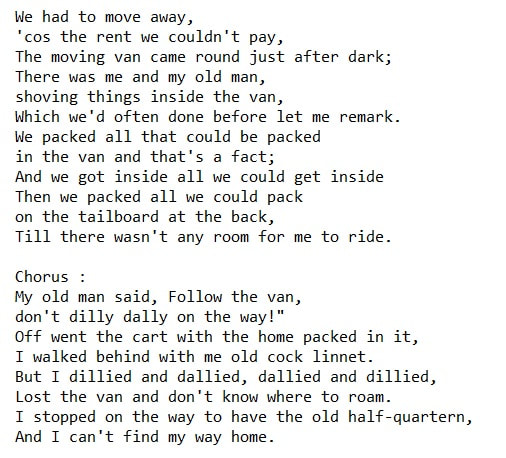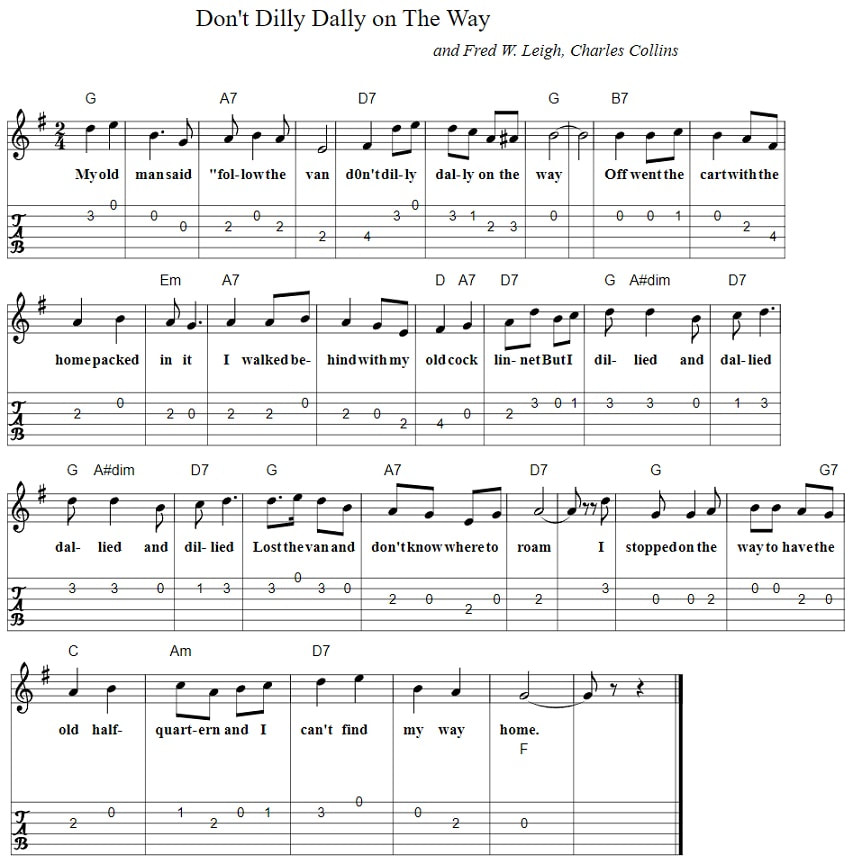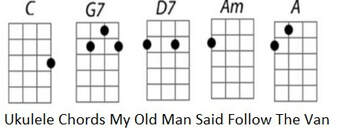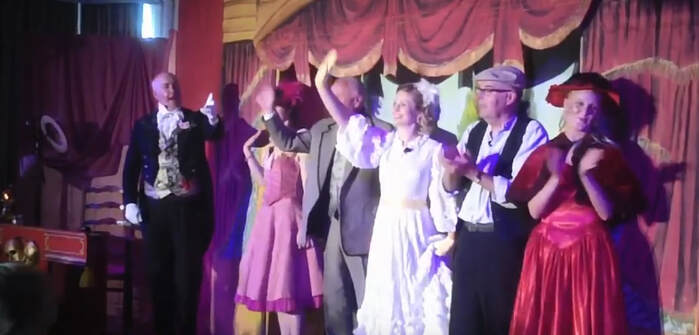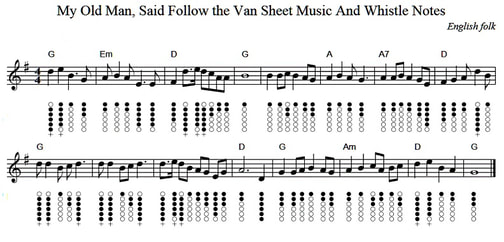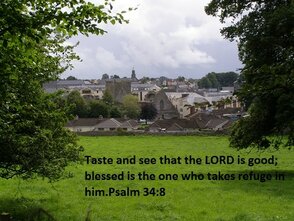My Old Man Said Follow The Van Song Lyrics And Guitar Chords
And sheet music. This was written in 1919 by Fred W. Leigh and Charles Collins, made popular by Marie Lloyd. The guitar chords in chordpro are in the key of D Major. An English music hall song that's still popular at parties today. Tin whistle sheet music notes included along with the ukulele chords
'My Old Man Said Follow The Van' is a classic British music hall song that has endured the test of time and remains a popular tune to this day. Written by Charles Collins and Fred W. Leigh in 1898, the song tells the story of a family's journey as they follow their father's horse-drawn van on their way to a new home. This seemingly simple and lighthearted song carries a deeper meaning and holds significant cultural and historical significance, making it a worthy subject of study.
The song's lyrics paint a vivid picture of a bygone era, where horse-drawn vans were a common mode of transportation for working-class families in Britain. This nostalgic portrayal of a simpler time evokes feelings of warmth and nostalgia, especially for those who have a personal connection to this era. The lyrics also reflect the strong sense of community and family values that were prevalent in British society at the time. The father's decision to have his family follow the van instead of traveling separately symbolizes the importance of sticking together and supporting one another, even in times of hardship.
One of the most fascinating aspects of this song is its ability to transcend time and remain relevant in the modern world. Despite being over a century old, 'My Old Man Said Follow The Van' has been adapted and covered by various artists, demonstrating its enduring appeal. This song has been recorded by artists such as Gracie Fields, Chas & Dave, and even The Beatles. Its adaptability and universal appeal speak to its timeless message and the enduring power of music to connect people across generations.
Moreover, the song's popularity and longevity can also be attributed to its use in popular culture. It has been featured in various films, television shows, and advertisements, ensuring its continued exposure to new audiences. This has helped the song transcend its original context and become a part of popular culture, further solidifying its significance and impact.
On a deeper level, 'My Old Man Said Follow The Van' can be interpreted as a commentary on the working-class experience in Britain during the late 19th and early 20th century. The van represents the family's livelihood, and their journey symbolizes the struggles and sacrifices made by the working-class to build a better life for themselves and their loved ones. The lyrics also touch upon themes of poverty, perseverance, and the desire for a better future, which were prevalent issues at the time. This song serves as a reminder of the hardships faced by the working-class and their resilience in the face of adversity.
Furthermore, 'My Old Man Said Follow The Van' is a significant representation of the music hall genre, which was a popular form of entertainment in Britain during the late 19th and early 20th century. Music hall songs were known for their catchy and often humorous lyrics, and their ability to appeal to a wide audience. This song's success and enduring popularity are a testament to the power of music hall songs to connect with people from all walks of life and provide a form of escapism from the harsh realities of the time.
In conclusion, 'My Old Man Said Follow The Van' is a song that holds a special place in British cultural history. Its enduring popularity, adaptability, and universal appeal speak to its significant impact on popular culture. The song's lyrics and themes reflect the values and struggles of working-class families in Britain, making it a valuable piece of social commentary. Its representation of the music hall genre and its ability to transcend time and remain relevant is a testament to its cultural and historical significance. Therefore, 'My Old Man Said Follow The Van' is not just a simple music hall song, but a reflection of British society and a symbol of the enduring power of music.
The song's lyrics paint a vivid picture of a bygone era, where horse-drawn vans were a common mode of transportation for working-class families in Britain. This nostalgic portrayal of a simpler time evokes feelings of warmth and nostalgia, especially for those who have a personal connection to this era. The lyrics also reflect the strong sense of community and family values that were prevalent in British society at the time. The father's decision to have his family follow the van instead of traveling separately symbolizes the importance of sticking together and supporting one another, even in times of hardship.
One of the most fascinating aspects of this song is its ability to transcend time and remain relevant in the modern world. Despite being over a century old, 'My Old Man Said Follow The Van' has been adapted and covered by various artists, demonstrating its enduring appeal. This song has been recorded by artists such as Gracie Fields, Chas & Dave, and even The Beatles. Its adaptability and universal appeal speak to its timeless message and the enduring power of music to connect people across generations.
Moreover, the song's popularity and longevity can also be attributed to its use in popular culture. It has been featured in various films, television shows, and advertisements, ensuring its continued exposure to new audiences. This has helped the song transcend its original context and become a part of popular culture, further solidifying its significance and impact.
On a deeper level, 'My Old Man Said Follow The Van' can be interpreted as a commentary on the working-class experience in Britain during the late 19th and early 20th century. The van represents the family's livelihood, and their journey symbolizes the struggles and sacrifices made by the working-class to build a better life for themselves and their loved ones. The lyrics also touch upon themes of poverty, perseverance, and the desire for a better future, which were prevalent issues at the time. This song serves as a reminder of the hardships faced by the working-class and their resilience in the face of adversity.
Furthermore, 'My Old Man Said Follow The Van' is a significant representation of the music hall genre, which was a popular form of entertainment in Britain during the late 19th and early 20th century. Music hall songs were known for their catchy and often humorous lyrics, and their ability to appeal to a wide audience. This song's success and enduring popularity are a testament to the power of music hall songs to connect with people from all walks of life and provide a form of escapism from the harsh realities of the time.
In conclusion, 'My Old Man Said Follow The Van' is a song that holds a special place in British cultural history. Its enduring popularity, adaptability, and universal appeal speak to its significant impact on popular culture. The song's lyrics and themes reflect the values and struggles of working-class families in Britain, making it a valuable piece of social commentary. Its representation of the music hall genre and its ability to transcend time and remain relevant is a testament to its cultural and historical significance. Therefore, 'My Old Man Said Follow The Van' is not just a simple music hall song, but a reflection of British society and a symbol of the enduring power of music.
Song words / chords in the key of D
[D]We had to[A7] move a[D]way,
'cos the rent we [A7]couldn't pay,
The moving van came [E]round just [E7]after [A]dark;
[A7]There was me and [E7]my old [A]man,
shoving [A7]things inside the [D]van,
Which[E] we'd often [E7]done before let me re[A]mark.
We packed[A] all that could be [A7]packed
in the [D]van and that's a [D7]fact;
And we [E7]got inside all we [A7]could get in[D]side
Then we [E] packed all we could [E7]pack
on the tail[A]board at the[A7] back,
Till there [Bm]wasn't any [E7]room for me to [A]ride.
Chorus :
[D]My old man said, [E7]Follow the van,
[A7]don't dilly dally on the [D]way!"
[A]Off went the cart with the [Bm]home packed in it,
I [E]walked behind [E7]with me [A]old [E7]cock linn[A7]et.
But I[D] dillied and [A7]dallied, [D]dallied and [A7]dillied,
[D]Lost the van and don't know [E7]where to [A]roam.
I stopped on the [B]way to [Em]have the old half-quar[A]tern,
And I [D]can't find [A7]my way [D]home.
[D]We had to[A7] move a[D]way,
'cos the rent we [A7]couldn't pay,
The moving van came [E]round just [E7]after [A]dark;
[A7]There was me and [E7]my old [A]man,
shoving [A7]things inside the [D]van,
Which[E] we'd often [E7]done before let me re[A]mark.
We packed[A] all that could be [A7]packed
in the [D]van and that's a [D7]fact;
And we [E7]got inside all we [A7]could get in[D]side
Then we [E] packed all we could [E7]pack
on the tail[A]board at the[A7] back,
Till there [Bm]wasn't any [E7]room for me to [A]ride.
Chorus :
[D]My old man said, [E7]Follow the van,
[A7]don't dilly dally on the [D]way!"
[A]Off went the cart with the [Bm]home packed in it,
I [E]walked behind [E7]with me [A]old [E7]cock linn[A7]et.
But I[D] dillied and [A7]dallied, [D]dallied and [A7]dillied,
[D]Lost the van and don't know [E7]where to [A]roam.
I stopped on the [B]way to [Em]have the old half-quar[A]tern,
And I [D]can't find [A7]my way [D]home.
